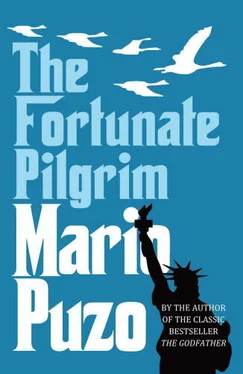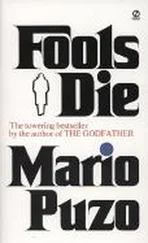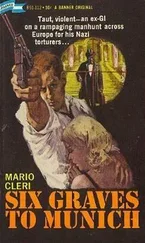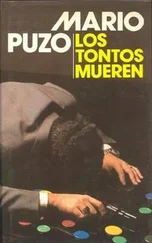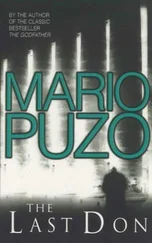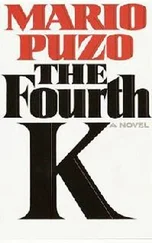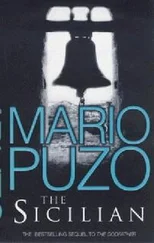She was too hot and too young to sleep. She dreamed. She dreamed of her real father.
Oh, how she had loved him, and how angry she had been that he let himself be killed, left her alone with no one to love. At the end of each day she had met him in front of the tenement and kissed his dirty bearded face, its black stubble so hard it bruised her lips. She carried his empty lunch pail up the stairs and sometimes cajoled from him the wicked steel clawed baling hook of the longshoreman.
And then in the house she set his plate for dinner, jealously placing the fork with the straight tines, the sharpest knife, his small wineglass polished and flashing like a diamond. Fussing until the exasperated Lucia Santa smacked her away from the table so that food could be served. And Larry, sitting in his high chair, could never interfere.
Even now, so many years later, waiting for sleep, the thought like a cry, “Why weren’t you more careful?” Reproaching him for his sinful death, echoing her mother, who sometimes said, “He didn’t take care of his family. He didn’t take care of his money. He didn’t take care of his life. He was careless in everything.”
Her father’s death had brought the thin blue-eyed stranger with his slanting, uneven face. The second husband, the stepfather. Even as a child she had never liked him, accepted his gifts distrustfully, stood with Larry in hand, holding him, hiding behind the mother’s back, until he patiently found her. Once he had made a gesture of affection and she shrank away from his hand like an animal. Larry was the favorite until his own children came. He never liked Vincent for some reason, the lousy bastard—hateful, hateful.
But even now she could not blame her mother for marrying, could not hate her mother for bringing so much sorrow. She knew why her mother married this evil man. She knew.
IT WAS ONE of the most terrible times of Lucia Santa’s life, and much of the distress that followed her husband’s death was the fault of friends, relatives, and neighbors.
They had, every one, kept after Lucia Santa to let the newborn infant, Vincent, be taken care of by a rich cousin, Filomena, in New Jersey. Just for a little while, until the mother regained her strength. “What a boon to that childless couple. And she can be trusted, Filomena, your own first cousin from Italy. The child would be safe. And the rich Filomena’s husband would then certainly consent to be godfather and assure the child’s future.” And how they had spoken in tones of most sorrowful pity, so tenderly, “And you, Lucia Santa, everyone worries about you. How meager you are. Not yet recovered from the birth. Still grieving over your beloved husband and torn to rags by lawyers over the settlement. You need a rest from care. Treat yourself well for your children’s sake. What if you should die?” Oh, no threat was too much for them. “Your children would perish or go into a home. They could not be sent to the grandparents in Italy. Guard your life, your children’s only shield.” And they went on and on. And the child would be back in a few months, no, a month, perhaps a few weeks. Who could tell? And Filomena would come Sundays, her husband drove a Forda. They would bring her to their beautiful home in Jersey to visit the baby Vincenzo. She would be an honored guest. Her other children would have a day in the country, in the fresh air. La la la la.
Now. How could she deny them or herself or her children? Even Zia Louche nodded her warty head in agreement.
Only little Octavia began to weep, saying over and over again with childish despair, “They won’t give him back.” Everyone laughed at her fear. Her mother smiled and patted Octavia’s short black curls, ashamed now of her own reluctance.
“Only until I am well,” she told the little girl. “Then Vincenzo will come home.”
Later the mother was not able to understand how she had come to let the child go. True, the shock of her husband’s death and a midwife’s harshness at Vincenzo’s birth had left her weak. But this never excused her in her own mind. It was an act that gave her so much shame, made her despise herself so much that whenever she had a difficult decision to make, she recalled that one act, to make sure she would not be cowardly again.
And so little Vincent had gone away. The strange Aunt Filomena had come one noon when Octavia was in school, and when Octavia came home the crib was empty.
She had wept and screamed, and Lucia Santa had given one the left hand, two the right hand, fine, heavy slaps across the face, making her little daughter’s ears ring, saying, “Now, there is something to make you cry.” Her mother was glad to get rid of the baby. Octavia hated her. She was evil, like a stepmother.
But then came that terrible beautiful day that had made her love and trust her mother. Part of it she saw herself as a little girl, but the story had been told innumerable times, so that now it seemed to Octavia as if she had seen everything. For naturally it was told; it became a legend of the family, mentioned in an evening of gossip, spread out at the Christmas table over walnuts and wine.
The trouble started after only a week. Filomena did not come that first Sunday, there was no automobile to take Lucia Santa to visit her infant son. Only a telephone message to the candy store. Filomena would come the following week, and to show her good heart and regret there would be a money order for five dollars in the mail, a small peace offering.
Lucia Santa brooded that dark Sunday. She went to take counsel with her neighbors on the floors below. They reassured her, urged her not to think foolish things. But as the day wore on she became more and more somber.
Early Monday morning she said to Octavia, “Run. Go to 31st Street and get Zia Louche.” Octavia wailed, “I’ll be late for school.” Her mother replied, “Today you are not going to your beautiful school”—saying it with such menace that the girl flew from the house.
Zia Louche came, a shawl around her head, a blue wool-knitted jacket reaching to her knees. Lucia Santa served the ceremonial coffee, then said, “Zia Louche, I am going to see the little one. Care for the girl and Lorenzo. Do me this favor.” She paused. “Filomena did not come yesterday. Do you think I should go?”
In later years Lucia Santa always insisted that if Zia Louche had reassured her she would not have gone that day, and that for the honest answer she would always remain in the old woman’s debt. For Zia Louche, nodding her old crone’s head like a repentant witch, said, “I gave you bad advice, Signora. People are saying things I don’t like.” Lucia Santa begged her to speak out, but Zia Louche would not, because it was all gossip, nothing to be repeated to an anxious mother. One thing could be noted, though: the promise to send five dollars. The poor did well not to trust such charity. Best to go, set everyone’s mind at rest.
In the gay light of winter, the mother walked to the Weehawken Ferry at 42nd Street, and for the first time since coming from Italy, she rode water again. In Jersey, finding a streetcar, she showed a slip of paper with the address on it, and then walked many blocks until a friendly woman took her by the hand and guided her to the dwelling of Filomena.
Ah, what a pretty house it was for the devil to live in. It had a pointed roof, like nothing she had ever seen in Italy, as if it were a plaything, not to be used for people full grown. It was white and clean, with blue shutters and a closed-in porch. Lucia Santa was suddenly timid. People so well off would never practice treachery on a poor woman like herself. The breaking of the Sunday promise could be explained in many ways. Still, she knocked on the side of the porch. She went through the screen door and knocked on the door of the house. She knocked again and again.
Читать дальше
